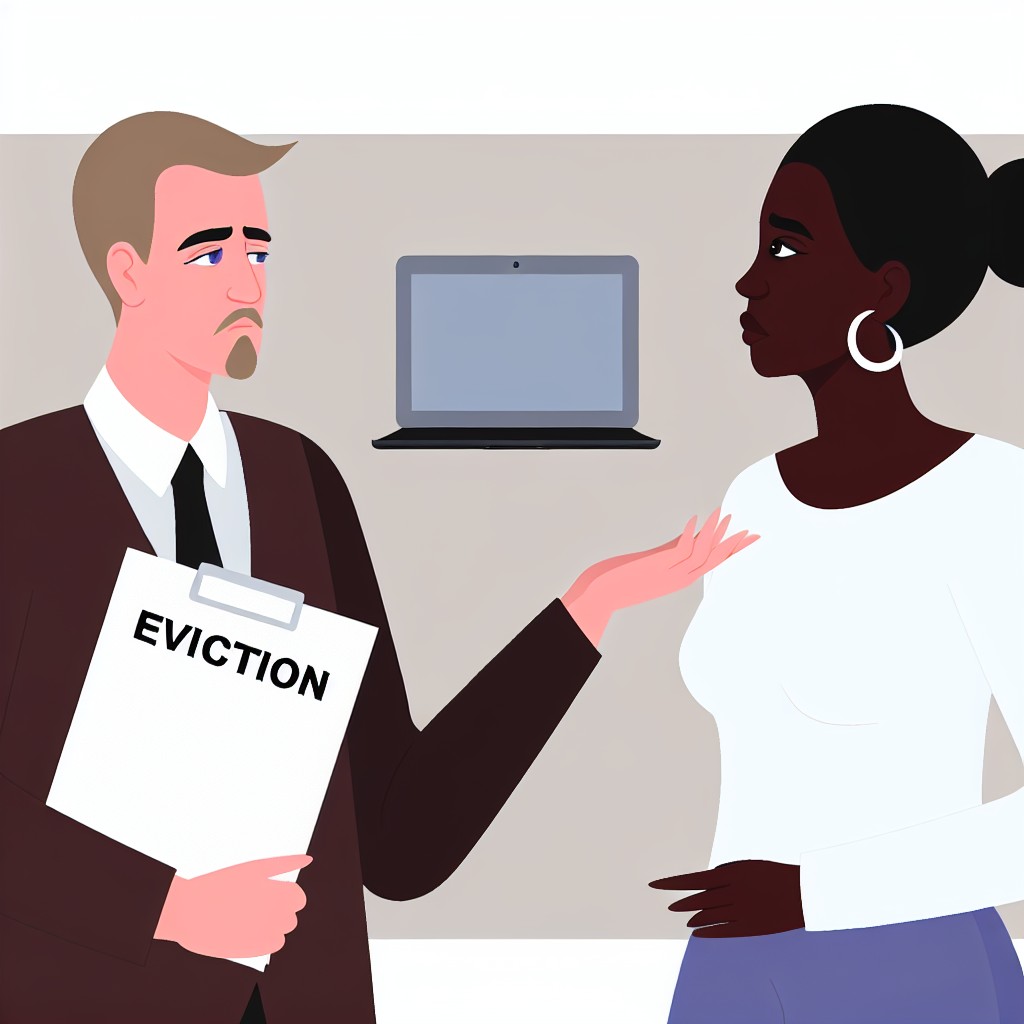Understanding the Eviction Process: An Overview of Legal Frameworks
Introduction to Eviction Laws
Eviction laws vary significantly across different states and municipalities.
Landlords and tenants must understand local legal requirements before starting eviction.
State-specific statutes govern notice periods, valid reasons, and court procedures.
This legal complexity makes awareness essential to avoid costly mistakes.
Key Steps in the Eviction Process
The eviction process typically begins with a written notice to the tenant.
This notice states the grounds for eviction and the timeframe for compliance or move-out.
Following notice, landlords may file an eviction lawsuit if the tenant does not comply.
Courts then review the case and may schedule a hearing to decide the outcome.
Finally, if the court rules in favor of the landlord, law enforcement can enforce the eviction.
Common Legal Grounds for Eviction
Landlords must prove the tenant violated specific lease terms or legal obligations.
Non-payment of rent remains the most common reason for eviction actions.
Other grounds include lease violations, property damage, or unlawful activities.
Additionally, landlords may evict tenants following lease expiration or for owner occupancy in some states.
Understanding Tenant Rights
Tenants retain important protections under eviction laws.
For example, landlords must provide proper written notice before proceeding.
Tenants have the right to contest eviction in court and present their case.
Some jurisdictions also require landlords to offer relocation assistance or additional protections.
Role of Courts and Legal Representation
Court procedures require strict adherence to timelines and documentation.
Failing to meet procedural rules can delay or invalidate eviction cases.
Many landlords seek legal advice from attorneys experienced in landlord-tenant law.
Likewise, tenants often benefit from consulting legal aid to understand their rights.
Impact of Federal and State Laws
Federal laws, such as the Fair Housing Act, prohibit eviction based on discrimination.
Emergency regulations may temporarily alter eviction procedures.
State laws provide additional layers of protection and vary in enforcement details.
Landlords like Evergreen Residential Group must stay updated on these evolving regulations.
Strategies to Prevent Legal Errors in Eviction
Careful documentation throughout the tenant relationship prevents disputes.
Landlords should issue all notices clearly and follow statutory timelines precisely.
Consulting experienced professionals reduces the risk of procedural missteps.
Understanding the legal framework safeguards both landlords and tenants alike.
Common Legal Mistakes Landlords Make During Evictions
Failing to Provide Proper Notice
Landlords often skip or delay sending the legally required eviction notice.
Without proper notice, courts may dismiss the eviction case outright.
Moreover, each state requires specific notice periods and wording.
Therefore, landlords should carefully follow their local laws.
For example, Emily Larson, a landlord in Seattle, lost her case due to improper notice.
Incorrect Service of Eviction Papers
Many landlords serve eviction papers incorrectly, invalidating the process.
Some deliver notices by email or leave them at the wrong address.
However, courts often require personal service or certified mail.
Consequently, landlords must confirm acceptable delivery methods beforehand.
In one case, Michael Thompson used a text message, which a judge rejected.
Attempting Self-Help Evictions
Self-help evictions, like changing locks or shutting off utilities, are illegal.
Some landlords, like Monica Pierce, act prematurely without a court order.
Courts view these actions as harassment and may penalize landlords.
Instead, landlords must wait for a legal judgment before removing tenants.
Hence, patience and legal compliance protect landlords from liability.
Ignoring Tenant’s Right to a Hearing
Landlords sometimes try to rush or avoid eviction hearings entirely.
This neglect violates tenants’ rights and may result in case dismissal.
Landlord-tenant laws require fair hearings to ensure due process.
Therefore, landlords must attend all hearings and present their case clearly.
For example, Brandon Kim lost possession because he missed the eviction hearing date.
Misunderstanding Local and State Laws
Landlords occasionally apply general eviction rules without checking local codes.
Eviction laws vary widely between cities and states.
Landlords like Sophia Martinez discovered stricter laws after starting evictions incorrectly.
Hence, consulting an experienced attorney prevents costly errors.
Additionally, local housing agencies often provide valuable guidance.
Not Documenting Communications and Payments
Landlords sometimes fail to keep records of rent payments and tenant interactions.
Judges require clear evidence of overdue rent and proper notices.
Without documentation, landlords may lose their case based on tenant disputes.
Therefore, thorough records protect landlords and clarify situations.
Jake Randall’s eviction succeeded only after he submitted detailed payment logs.
Using Eviction for Retaliation or Discrimination
Evictions motivated by retaliation or discrimination violate federal and state laws.
Landlords must avoid evicting tenants for reporting repairs or exercising rights.
Similarly, evictions based on race, gender, or disability are illegal.
Legal counsel can help landlords navigate these sensitive situations properly.
Otherwise, landlords face lawsuits and penalties for unlawful evictions.
Rushing the Eviction Without Exploring Alternatives
Many landlords jump straight to eviction instead of seeking resolutions.
Offering payment plans or mediation can prevent lengthy legal battles.
Thus, considering alternatives protects landlord-tenant relationships.
For instance, Hannah Blake successfully avoided court by negotiating with a late tenant.
Ultimately, proactive communication benefits both parties.
Importance of Clear Lease Agreements in Avoiding Disputes
Clarity Prevents Misunderstandings
Clear lease agreements reduce the risk of tenant and landlord conflicts.
They define each party’s rights and responsibilities explicitly.
Therefore, misunderstandings about rent, maintenance, or rules are less likely.
For example, precise clauses on late payments avoid confusion over fees.
Consequently, this prevents unnecessary disputes during the tenancy.
Key Elements of an Effective Lease Agreement
A comprehensive lease should state the rental amount and payment terms clearly.
It must outline maintenance and repair obligations for both landlord and tenant.
Additionally, the lease should include rules about property use and behavior.
This includes pet policies, noise limits, and guest restrictions.
Finally, the agreement should specify lease duration and termination conditions.
Benefits in the Eviction Process
Clear agreements simplify the eviction process if it becomes necessary.
Courts rely heavily on lease terms to judge eviction validity.
If terms are ambiguous, landlords face delays and legal challenges.
Conversely, clear agreements support faster resolutions with documented proof.
Thus, landlords like Sarah Weston avoid costly legal pitfalls.
Working with Legal Professionals
Consulting legal experts ensures leases comply with local laws.
Lawyers help tailor clauses to fit state-specific eviction regulations.
For instance, attorney Marcus Levin reviewed Greenfield Properties’ leases last year.
This step decreases the chance of enforceability issues in court.
Furthermore, professional input builds confidence in the lease’s effectiveness.
Regular Lease Reviews and Updates
Landlords should review lease agreements periodically for legal changes.
Updating leases keeps terms aligned with new housing laws.
For example, after recent tenant rights legislation, Horizon Realty revised its contracts.
Such proactive measures maintain lease clarity and fairness.
Ultimately, this practice reduces disputes and promotes positive landlord-tenant relationships.
See Related Content: Lease Agreements for Shared Housing and Co-Living
Proper Notification
Serving Eviction Notices Legally
Eviction notices must comply with local and state laws to be valid.
Landlords should understand the specific notice requirements in their jurisdiction.
The type of notice and the time frame can vary significantly.
Landlords should ensure the notice clearly states the reason for eviction.
The notice must include the deadline for the tenant to remedy the issue or vacate.
Methods of Delivering Eviction Notices
Landlords can serve eviction notices in several legally accepted ways.
Hand delivery to the tenant is the most direct and preferred method.
If the tenant is unavailable, landlords may use certified mail with a return receipt.
This method provides proof that the tenant received the notice.
In some cases, posting the notice on the tenant’s door is legally allowed.
Landlords must verify local laws before using posting as a delivery method.
Maintaining Proper Documentation
Landlords should keep detailed records of how and when notices are served.
These records protect landlords if the eviction is challenged in court.
Examples include keeping receipts from certified mail and written acknowledgments from tenants.
Photographs of posted notices can serve as evidence of delivery.
Common Legal Mistakes to Avoid
Landlords often make mistakes carrying out eviction notices.
One common error is failing to follow the exact notice period required by law.
Another mistake is using improper language that fails to communicate the eviction reason clearly.
Serving notices on unauthorized individuals can render the eviction invalid.
Landlords should confirm the tenant’s residency or authorized representatives.
Importance of Seeking Legal Advice When Uncertain
When in doubt, landlords should consult with an eviction attorney.
A qualified lawyer can ensure eviction notices comply with all legal requirements.
Attorneys can help landlords avoid costly delays or dismissal of their eviction cases.
Proper legal guidance reduces risks and streamlines the eviction process effectively.
Gain More Insights: Guide to Handling Lease Violations and Tenant Noncompliance
Gathering and Maintaining Evidence
Importance of Accurate Documentation
Accurate documentation protects landlords from legal challenges during eviction.
Moreover, it provides clear evidence in court proceedings.
Without proper records, the eviction process may face delays or dismissal.
Therefore, keep all documents organized and easily accessible.
Essential Types of Evidence to Collect
Collect communication records including emails, letters, and text messages.
Also, gather copies of the lease agreement signed by both parties.
Additionally, maintain payment histories showing rent received and missed payments.
Photographs of property conditions support claims of damage or neglect.
Finally, record any notices served to tenants, such as eviction or warning letters.
Best Practices for Maintaining Documentation
Store digital copies of all documents securely using encrypted cloud storage.
Also, keep hard copies in a designated file folder with clear labels.
Update records promptly after each transaction or communication.
Use consistent file naming conventions incorporating dates and tenant names.
Regularly back up data to avoid accidental loss or corruption.
Furthermore, ensure that all documents comply with local privacy laws and regulations.
Using Technology to Streamline Evidence Management
Consider property management software to automate record-keeping tasks.
Such tools facilitate tracking rent payments and sending reminders efficiently.
They also generate reports that simplify court presentations.
Moreover, mobile apps allow instant photo uploads directly connected to tenant files.
Choose platforms with strong security features to protect sensitive information.
Working With Legal Professionals
Consult attorneys to understand which documents carry the most weight legally.
They can advise on specific evidence requirements according to jurisdiction.
Retain copies of any legal advice or correspondence for future reference.
Additionally, lawyers can review your documentation practices to ensure compliance.
Ultimately, this partnership reduces the risk of procedural mistakes during eviction.
Delve into the Subject: Fair Housing Laws for Property Managers

Avoiding Retaliation Claims: Understanding Tenant Rights
Recognizing Tenant Protections
Landlords must understand tenant rights before starting any eviction process.
Many states have laws that protect tenants from retaliatory evictions.
Retaliation claims often arise when tenants exercise their legal rights.
For example, tenants may report unsafe conditions or request repairs.
Consequently, landlords should avoid evicting tenants in response to such actions.
Understanding these protections helps landlords navigate disputes effectively.
Common Actions That Trigger Retaliation Claims
Evicting tenants shortly after they complain about housing conditions raises suspicion.
Also, tenants who lawfully organize tenant unions receive protection against eviction.
Likewise, tenants who request code enforcement inspections should not face eviction.
Retaliation claims can also arise when landlords raise rent after protected activities.
Therefore, landlords should carefully document their reasons for eviction.
Best Practices to Avoid Retaliation Allegations
Maintain thorough records of all tenant communications and repair requests.
Respond promptly to tenant complaints to demonstrate good faith efforts.
Ensure eviction notices clearly state legitimate, non-retaliatory reasons.
Consult attorney Maria Hernandez from Evergreen Property Solutions for legal guidance.
Additionally, allow a reasonable time between tenant complaints and eviction actions.
Following proper procedures minimizes risks of retaliation claims and legal disputes.
Understanding Legal Timelines and Notices
Laws often require a waiting period before filing eviction after tenant complaints.
This period gives tenants time to resolve disputes or correct issues raised.
For instance, Illinois law mandates a 6-month window before eviction for certain complaints.
Providing clear, written notices protects landlords from claims of unfair treatment.
Moreover, working with experts like attorney Kevin Morris can ensure compliance.
Communication Strategies to Reduce Conflict
Open and respectful communication helps landlords avoid misunderstandings.
Discuss concerns with tenants before taking formal eviction steps.
Use mediation or dispute resolution services to settle conflicts amicably.
Document all communications to create transparency throughout the process.
Ultimately, fostering cooperation can prevent costly legal battles.
Explore Further: Property Management Licensing and Legal Requirements
Navigating Local Laws and Regulations
Researching Your Jurisdiction
Understanding local eviction laws starts with thorough research of your jurisdiction.
Each state, city, and county may have unique rules governing the eviction process.
Therefore, landlords should review municipal codes and state statutes carefully.
To begin, visit official government websites for the most accurate legal information.
For example, the New York City Housing Preservation & Development website provides detailed tenant and landlord guidelines.
In addition, local law libraries often hold updated legal resources accessible to the public.
Also, consulting legal databases such as Westlaw or LexisNexis can help identify specific regulations.
Moreover, tenant protection ordinances may impose additional restrictions beyond state law.
For instance, some jurisdictions require landlords to provide relocation assistance in eviction cases.
Therefore, landlords like Gregory Hill recommend checking local tenant protection rules before proceeding.
Consulting Qualified Legal Professionals
Because laws can be complex, seeking advice from experienced eviction attorneys is wise.
Local attorneys understand regional nuances that might affect your case.
For example, Marina Lopez, a Boston-based housing attorney, advises reviewing lease agreements alongside eviction laws.
Furthermore, attorneys can help you avoid procedural errors that courts commonly reject.
Legal experts may also provide guidance on recent legal updates and emergency orders.
Such orders sometimes suspend or alter eviction deadlines under special circumstances.
Therefore, working with a lawyer like Samuel Carter can save time and litigation costs.
Utilizing Local Government Resources
Many municipalities offer eviction resources through housing departments or tenant advocacy groups.
These resources often include step-by-step eviction guides tailored to local laws.
For example, Seattle’s Office of Housing provides landlords with eviction procedure checklists.
Additionally, local courts may have self-help centers with forms and filings required for the eviction process.
Landlords can access these services to ensure compliance with filing deadlines and documentation requirements.
Moreover, attending community workshops on landlord-tenant law promotes better understanding.
Housing nonprofit organizations frequently host such educational sessions free of charge.
Maintaining Awareness of Legal Changes
Eviction laws can change due to new legislation or judicial decisions.
Therefore, stay updated by subscribing to newsletters from housing law organizations.
For instance, the California Apartment Association sends timely alerts regarding law amendments.
Besides newsletters, follow local court rulings that might redefine eviction procedures.
For example, recent rulings in Cook County, Illinois, affected notice requirements in eviction cases.
Setting reminders to review laws periodically helps landlords avoid outdated practices.
Thus, proactive legal research ensures compliance and reduces the risk of costly mistakes.
When to Seek Legal Counsel
Recognizing Complex Eviction Situations
Eviction cases often involve complicated legal procedures.
Whenever uncertainty arises, consulting a professional lawyer is wise.
For example, disputes over lease terms or tenant rights can be tricky.
Likewise, cases involving unclear documentation also require expert help.
Therefore, avoid handling challenging issues without legal guidance.
Signs That Indicate the Need for Legal Assistance
If a tenant threatens to contest the eviction, seek counsel immediately.
Additionally, unresolved conflicts about rent payments suggest professional intervention.
Moreover, when local eviction laws change, legal advice becomes essential.
If deadlines for notices or filings confuse you, a lawyer can clarify.
Ultimately, professional help reduces costly and time-consuming mistakes.
Benefits of Consulting an Eviction Attorney Early
Legal experts like Rebecca Whitman ensure eviction notices follow state laws.
They prepare accurate court documents with minimal delays.
Consequently, landlords avoid potential dismissals due to technical errors.
Furthermore, attorneys negotiate with tenants to resolve conflicts amicably.
This approach saves time and preserves landlord-tenant relationships.
Ways to Find the Right Legal Counsel
Start by asking trusted colleagues for recommendations.
Also, check local bar associations for qualified eviction attorneys.
Online reviews help assess lawyers like Martin Caldwell’s reputation.
Ensure the attorney has experience with landlord-tenant law in your area.
Schedule consultations to discuss specifics and gauge comfort level.
Knowing When to Handle Evictions Independently
Simple, uncontested evictions with clear lease violations might not require lawyers.
For example, straightforward nonpayment cases where notices follow legal standards.
However, stay alert for any tenant disputes that may complicate the process.
If issues grow, promptly switch to professional legal assistance.
Doing so balances cost savings with legal risk management effectively.




